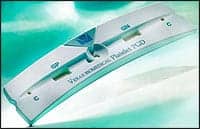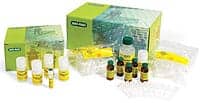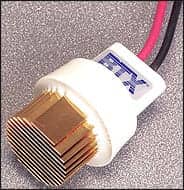Verax Platelet PGD Test
Rapid bacteria test

Abbott, Abbott Park, Ill, has introduced the Verax Platelet PGD test, a first-generation, single-use, rapid qualitative immunoassay test that detects bacteria in human platelets. The disposable device detects the presence of a range of bacterial contaminants in platelets prior to blood transfusion. It is suited for quality control testing of leukocyte-reduced platelet units collected from blood donors, and to detect aerobes and anaerobes—bacteria that need oxygen for their sustenance and those that do not. The test targets antigens found on all species of bacteria known to be pathogenic to humans, and delivers results in less than 30 minutes. The test supplements quality-control testing methods used by blood establishments following collection of platelets using an automated instrument, and is not intended for use in determining whether leukocyte-reduced platelets may be released for transfusion. It is available in the United States, and the company has signed an exclusive distribution agreement with Verax Biomedical Inc for worldwide distribution rights. Verax received 510(k) clearance from the FDA in September 2007.
Abbott
(847) 937-6100
www.abbott.com
ProteoMiner
Protein-enrichment kits

Bio-Rad Laboratories Inc, Hercules, Calif, introduces its new ProteoMiner protein-enrichments kits, which allow researchers to concentrate and enrich low- and medium-abundance proteins that cannot be detected through traditional methods. The kits are compatible with a variety of sample types and can be used with many downstream protein-analysis techniques, including 1D or 2D gel electrophoresis, chromatography, and surface-enhanced laser desorption/ionization. The kits employ a bead-based technology, which uses a library of combinatorial peptide ligands to simultaneously dilute high-abundance proteins and concentrate low-abundance proteins. When a complex biological sample is applied to the beads, high-abundance proteins saturate their high-affinity ligand(s), and excess protein is washed away. In contrast, low-abundance proteins are concentrated on their specific affinity ligand(s). Two kit formats are available to provide flexibility for use with multiple downstream applications. Both are for use with serum and plasma samples, but they may be used with other sample types with at least 50 mg total protein available. The introductory kit provides columns and necessary reagents for accessing low-abundance proteins in a variety of biological samples, and is compatible with the majority of downstream proteomics applications. The kit can be used to process two samples. The full-size kit can be used to process up to 10 samples. The sequential elution kit is available for researchers who wish to elute their proteins into multiple fractions to detect additional proteins. It has been optimized for SELDI experiments and provides columns and reagents for processing up to 10 samples.
Bio-Rad Laboratories Inc
(800) 224-6723
www.bio-rad.com
Petri Pulser
In situ electroporation

The Petri Pulser from BTX, Holliston, Mass, is suited for in situ electroporation of mammalian cell transfections, gene therapy, or drug delivery. The reusable electrode fits into a single well or six-well plate, or in an individual 35-mm plate. The gold electrodes are 2 mm apart and can be used with BTX generators. The electroporation of adherent cells avoids the need for chemical disassociation of cells, and eliminates many problems associated with low-plating efficiencies flowing electroporation.
BTX
(800) 272-2775
www.btxonline.com


